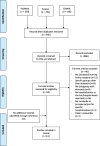Hospitalization at the end of life among nursing home residents with dementia: a systematic review
- PMID: 31506100
- PMCID: PMC6737675
- DOI: 10.1186/s12904-019-0462-1
Hospitalization at the end of life among nursing home residents with dementia: a systematic review
Abstract
Background: Half of nursing home residents (NHR) suffer from dementia. End-of-life hospitalizations are often burdensome in residents with dementia. A systematic review was conducted to study the occurrence of hospitalizations at the end of life in NHR with dementia and to compare these figures to NHR without dementia.
Methods: A systematic literature search in MEDLINE, CINAHL and Scopus was conducted in May 2018. Studies were included if they reported proportions of in-hospital deaths or hospitalizations of NHR with dementia in the last month of life. Two authors independently selected studies, extracted data, and assessed quality of studies.
Results: Nine hundred forty-five citations were retrieved; 13 studies were included. Overall, 7 studies reported data on in-hospital death with proportions ranging between 0% in Canada and 53.3% in the UK. Studies reporting on the last 30 days of life (n = 8) varied between 8.0% in the Netherlands and 51.3% in Germany. Two studies each assessed the influence of age and sex. There seem to be fewer end-of-life hospitalizations in older age groups. The influence of sex is inconclusive. All but one study found that at the end of life residents with dementia were hospitalized less often than those without (n = 6).
Conclusions: We found large variations in end-of-life hospitalizations of NHR with dementia, probably being explained by differences between countries. The influence of sex and age might differ when compared to residents without dementia. More studies should compare NHR with dementia to those without and assess the influence of sex and age.
Trial registration: PROSPERO registration number CRD42018104263 .
Keywords: Death; End-of-life care; Health services research; Hospital use; Long-term care; Nursing homes.
Conflict of interest statement
The authors declare that they have no competing interests.
Similar articles
-
Hospitalizations of nursing home residents at the end of life: A systematic review.Palliat Med. 2019 Dec;33(10):1282-1298. doi: 10.1177/0269216319866648. Epub 2019 Aug 1. Palliat Med. 2019. PMID: 31368855 Free PMC article.
-
[Hospitalization of nursing home residents in the last phase of life: an analysis of health insurance data].Z Gerontol Geriatr. 2021 May;54(3):247-254. doi: 10.1007/s00391-020-01716-3. Epub 2020 Mar 17. Z Gerontol Geriatr. 2021. PMID: 32185465 Free PMC article. German.
-
Dying in hospital among nursing home residents with and without dementia in Germany.Arch Gerontol Geriatr. 2019 May-Jun;82:293-298. doi: 10.1016/j.archger.2019.03.013. Epub 2019 Mar 19. Arch Gerontol Geriatr. 2019. PMID: 30909116
-
Sex-Specific Differences in End-of-Life Burdensome Interventions and Antibiotic Therapy in Nursing Home Residents With Advanced Dementia.JAMA Netw Open. 2019 Aug 2;2(8):e199557. doi: 10.1001/jamanetworkopen.2019.9557. JAMA Netw Open. 2019. PMID: 31418809 Free PMC article.
-
Age and sex differences in emergency department visits of nursing home residents: a systematic review.BMC Geriatr. 2018 Jul 3;18(1):151. doi: 10.1186/s12877-018-0848-6. BMC Geriatr. 2018. PMID: 29970027 Free PMC article.
Cited by
-
The Effect of Influenza Vaccination on Hospitalization and Mortality Among People With Dementia.J Am Geriatr Soc. 2025 May;73(5):1498-1505. doi: 10.1111/jgs.19392. Epub 2025 Mar 23. J Am Geriatr Soc. 2025. PMID: 40123175 Free PMC article.
-
End-of-life care in German and Dutch nursing homes: a cross-sectional study on nursing home staff's perspective in 2022.Arch Public Health. 2024 Jun 14;82(1):85. doi: 10.1186/s13690-024-01316-2. Arch Public Health. 2024. PMID: 38877598 Free PMC article.
-
Predictors of hospitalisations and emergency department presentations shortly after entering a residential aged care facility in Australia: a retrospective cohort study.BMJ Open. 2021 Nov 17;11(11):e057247. doi: 10.1136/bmjopen-2021-057247. BMJ Open. 2021. PMID: 34789497 Free PMC article.
-
Exploring costs, cost components, and associated factors among people with dementia approaching the end of life: A systematic review.Alzheimers Dement (N Y). 2021 Sep 14;7(1):e12198. doi: 10.1002/trc2.12198. eCollection 2021. Alzheimers Dement (N Y). 2021. PMID: 34541291 Free PMC article. Review.
-
Implementation, barriers, and recommendations for further development of advance care planning for the last phase of life in nursing homes in Germany (Gut-Leben): protocol for a mixed-methods study.BMC Palliat Care. 2023 Mar 24;22(1):27. doi: 10.1186/s12904-023-01147-y. BMC Palliat Care. 2023. PMID: 36964521 Free PMC article.
References
Publication types
MeSH terms
LinkOut - more resources
Full Text Sources
Medical
Molecular Biology Databases


